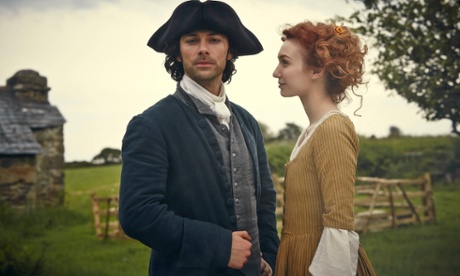
Among the new shows premiered in the BBC TV schedules for 1975 were Fawlty Towers, Jim’ll Fix It and Poldark. And these three series neatly illustrate the different issues that arise when deciding if a programme from the past should be remade.
John Cleese’s and Connie Booth’s sitcom about an incompetent hotelier is so revered and perfectly achieved that it would surely be critical and ratings suicide to produce a new version; better simply to repeat the 40-year-old episodes. The children’s wish-fulfillment show is equally unlikely to have any further life because of the toxicity of the concept following the posthumous exposure of its presenter, Jimmy Savile, as a serial paedophile.
Poldark, though, occupies the middle ground from which remakes often come, suffering no notoriety but, while successful at the time, not considered untouchably brilliant. So, four decades after the start of the original BBC1 series, the same network is launching, at 9pm Sunday, a new adaptation of Winston Graham’s novels set in 18th-century Cornwall.
Ross Poldark, heir to a collapsing mining dynasty, survives near-fatal ambush while fighting for the king in the American wars of independence and returns home with a vast scar on his face, to sustain another on his heart: his beloved, Elizabeth, assuming him dead, has contracted marriage to another man. Finding his family estate taken over by rats and servants, Ross saves a beautiful young woman, Demelza, from her violent family and employs her as his servant as he attempts to restore his fortunes.
Aidan Turner and Eleanor Tomlinson take on the roles of Ross and Demelza played by Robin Ellis and Angharad Rees in the first version. Regardless of whether the drama again becomes a bankable franchise for the BBC, it seems certain to give the male lead a shot at becoming a Hollywood heart-throb. A fire-fighter with 40 years service will have seen less smouldering than Turner does in the opening episode alone.
The new Poldark reflects two present trends in British TV. In a broadcasting market with less money but more competition, an already-known title is a safer bet to attract viewers and publicity than a show that has to start with a stranger’s hand-shake. The hope that familiarity might avoid contempt is the reason that ITV is working on a new version of the puppet show Thunderbirds. It was also canny of Netflix to launch a novel way of watching TV – self-scheduled streaming – with a product to which potential customers were already accustomed: the BBC drama House of Cards, though relocated from Westminster to Washington.
The genre divides between official remakes – both House of Cards and both Poldarks are based on their original source material – and what might be called spiritual revisitings. Indian Summers is a more multicultural cousin of the 1984 ITV Raj drama the Jewel in the Crown, while Downton Abbey is on the same family tree as ITV’s early-1970s stately home show Upstairs, Downstairs, although, ironically, it has been far more successful than the BBC’s brief attempt to revive Upstairs, Downstairs itself.
House of Cards is unusual among the remakes in being a contemporary narrative; in nervous and conservative times, audiences seem particularly to appreciate costume drama. Poldark will fight its time-slot against two other period pieces – ITV’s Mr Selfridge and Channel 4’s Indian Summers. On BBC2 this week, the 18th-century Banished replaced the 16th-century Wolf Hall, while ITV has just started the early 20th-century Arthur & George.
Poldark is also positioned to benefit from another fashion in the medium. From Doc Martin via Broadchurch to Jamaica Inn, west country settings have become prime TV real estate. However, on the evidence of the first part, this Cornish drama should not become involved, as Jamaica Inn did, in grumbling over mumbling: even the unschooled Demelza could win an elocution contest.
With corsets, horses and green fields sweeping to the edge of sun-speckled sea, Poldark offers much of what mainstream viewers now seem to want. And a major justification for looking backwards is that the new version benefits from superior technology. In the 1975 version, when characters are travelling, you can see the moving background projected on a screen behind them.
The other costume hits of Poldark’s era were the Forsyte Saga – remade by the BBC last decade to moderate acclaim – and the Pallisers, a Victorian saga taken from the novels of Anthony Trollope. That might be a good bet for the next drama to be seen again in a time when it is regarded as a smart move for a drama to be deja-vu.

